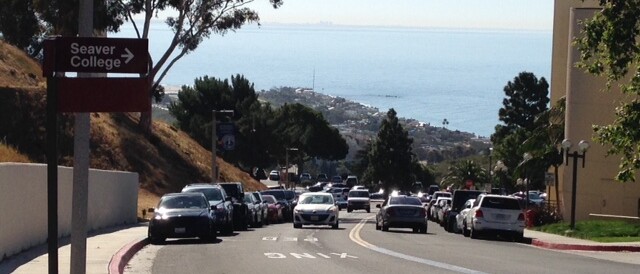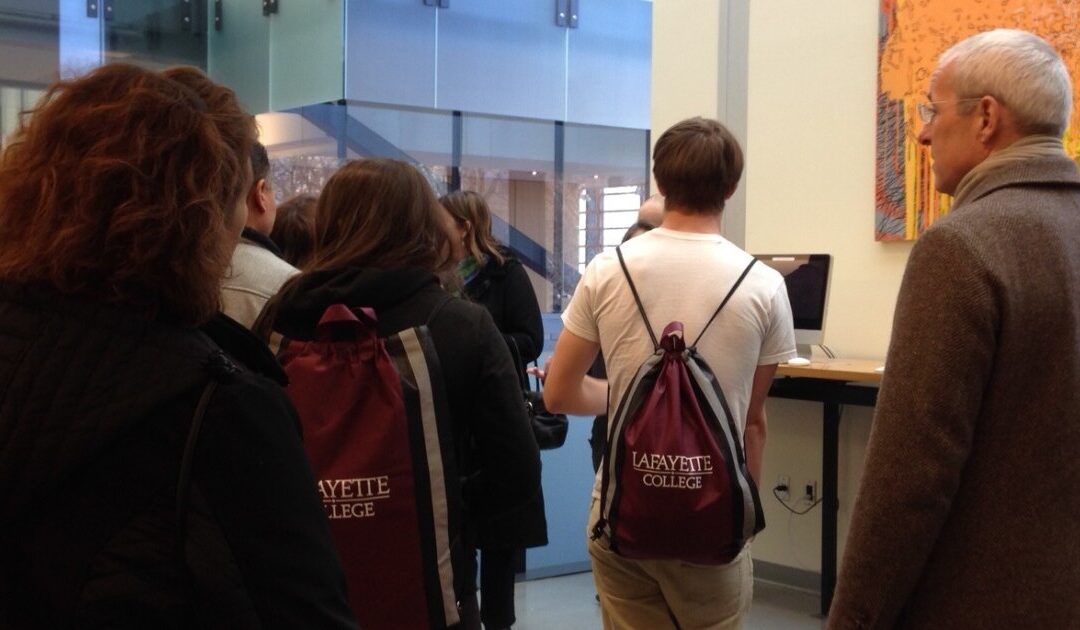
by College Goals
A recent article by Verónica Leyva takes issue with students paying undue attention to their choice of majors when researching colleges. In Major Myths, Busted, she argues instead for approaching the college search with an open mind, agnostic about any one path towards a degree. There are, after all, countless pathways to many careers, and colleges tend to be more interested in students who are motivated to learn than those narrowly focused on a major.
I think that Ms. Leyva’s arguments are absolutely sound and we should encourage high school students to identify their academic interest – a desire to engage with certain ideas or questions or modes of learning – and not simply a prospective major – an academic basket of courses set by faculty in the field to enable students to reach towards mastery in one discipline.
To the reasons why high school students should not fixate only on their prospective major, I would add the fact that they will likely change their minds anyway! Little point to researching only colleges with outstanding programs in Astrophysics if in the end you might opt to major in Anthropology instead! (I remember fondly a freshman advisee of mine at Brown who came set on studying Physics, before cycling through Philosophy and graduating as a Music major!) As Homer Simpson reminded Lisa, there is a time and a place for everything and it is called college – a time to try new ideas well beyond the narrow prescriptions of high school and challenge your mind beyond your own expectations. And most high school students are so trained to the narrow “boxes” of five core academic disciplines that they have little concept of how those translate into the 100 or more majors of a typical liberal arts university anyway!
There are good reasons for our current pushback against the tyranny of the major in students’ perception of where they should go to college and why. Many counselors have sat with students who, in months past, had lit up as they talked about their passion for the study of history or for the exploration of their favorite solar system. But then college admission comes into play, and suddenly they fixate on applying for the hot major du jour – computer science, chemical engineering, data science. This in spite of the work of economists like Doug Weber, who has shown that while right out of college STEM fields might yield more professional success, they do not inevitably pay better when measured by lifetime earnings.
And yet, having said all this, after twenty years as a college and academic advisor, I have also come to doubt how far we should go in the opposite direction, towards encouraging high school students to ditch all consideration of prospective majors. In part, this is because of the admission process itself (as I noted in a recent post). Majors are the bureaucratic building blocks of an undergraduate degree. Even the majority of liberal arts colleges that allow students to defer declaring a major for a year or two, still ask about intended majors in their applications. A college where the Environmental Studies department has just expanded might well want to make sure that those professors have a gratifyingly large number of prospective majors; and a college where the Classics faculty takes an interest in admission, might well take note of exceptional young Latin scholars.
Moreover, having students think about prospective majors is not at odds with having them identify exciting intellectual reasons for going to college. In fact, seeing how their intellectual interests connect with a particular academic discipline can help give teenagers a scaffolding with which to explore the things they find curious and exciting. I remember, when I first went to university eons ago, how validating it was to realize that people who were experts in the things I was curious about had thought those mattered enough to gather a corpus of knowledge about them and call it a History major! The practitioners of an academic discipline also use their own linguistic conventions to express their questions and concerns – and how liberating for young people to gain insight into that language in order to express their own ideas!
Ultimately though, my point is simply that an American liberal arts education is an extraordinary way of thinking about one’s learning, and students should look at the exciting range of possibilities it offers them, rather than cast around for a narrow academic box to climb into. But college is also not summer camp, and a conversation about majors might be another way to encourage high school students to view their learning with an equally important and exciting search for rigor and intellectual depth.[/vc_column_text][/vc_column][/vc_row]

by College Goals
Visiting a college campus can be overwhelming. By the time you (and your parent) sink back into your car, do you feel you know more? Or are you more confused? Try to ‘do your homework’ on some of these issues before (and after!) you schedule your trip!
Below is a list of campus options and characteristics which current college students and professional educators consider important benchmarks in evaluating the educational and developmental opportunities on any campus. Some will be more significant than others for you, but we hope this list will help you to learn more about the schools you visit, and to see each campus deeply, beyond the buildings and the trees.
- Does this institution challenge your assumptions and take you outside your comfort zone? Will it prepare you for future globalization and for living/working within the increasingly broad diversity of values, perspectives, experiences within your country?
- What are the opportunities for cross-disciplinary studies – through concentrations/majors?
- Independent Studies? Group Independent Studies? What supports?
- What are some of the strongest departments for undergraduate students?
- If you are interested in, for example, how children or adults learn, will you be able to find relevant classes in many areas/departments, including Psychology? Sociology? Education? Public Policy? Computer Science? Philosophy? Cognitive Science? Modern Culture and Media?
- What attention/support do students get from faculty in the department in which they chose to major?
- How is teaching valued vs. research by the faculty? By the university?
- How easy is it to change curricular choices? Programs? Majors?
- What opportunities are there for students and faculty to interact outside of the classrooms? (Do they all use the campus coffee shops, lunchrooms, service projects, attend campus lectures, etc.)
- How does this university value its undergraduate college(s) compared to its professional schools?
- During college, will there be opportunity for you to do academic work in groups?
- What are the consequences of taking academic challenges that don’t work? Of making mistakes, without failing? – are they viewed as learning experiences?
- Are classes/sections led/taught by other students? Graduate students? Undergraduate?
- How hard is it to get into the courses you want?
- What size are the average classes – for first-year students and sophomores? Especially science classes?
- Is there a requirement or opportunity to do a thesis or a capstone project?
- What are an undergraduate’s chances of doing research with a faculty member? Summers? Semesters? 1st, 2nd,3rd, 4th year?
- Are there opportunities to work as a Teaching Assistant? Are in-the-field internships available?
- Are there Study Abroad opportunities – summers? Semester/year? What percentage of students study abroad? Where? In what academic year? Support for students abroad? Does Financial Aid ‘travel’ abroad with students? How many/what programs are based at this school? Issues about transferring credit?
- Does this college allow its students to Study Away in the USA – summers? Semester/year? Programs? Transfer credit available?
- What are the resources on campus for Study Skills training? By peers? Professionals? Cost?
- What is the Academic Advising Program like for first-years? Sophomores? Upperclassmen? Concentration/majors? Who advises – faculty? Professionals? Student peers? How do students rate advising? How do they use it? Departmental support?
- Are there opportunities to work as a Peer Academic Advisor? Or as a Peer Residential Advisor? If so, must they monitor/report on their constituents? Are there professional/adult/faculty Residential Fellows?
- Do students mainly live off or on campus, after their first year? How open/closed are the dorms? How do people who do not live in the dorms gain access?
- What are the students’ major issues regarding safety? What safety measures have been put in place?
- What percentage of the campus is fraternity/Greek oriented? How big a part do they play in all students’ life? What’s the general attitude towards ‘nerds and geeks?’
- What are the creative opportunities? University supported and/or student initiative opportunities in theatre? Music? Dance? Debate? Student government? Service? . . . on and on –
- What does the weekend social life revolve around? Are there off-campus options? Do students talk about having fun learning, or is fun = partying? What are the alcohol policies, and how are they enforced?
- How are athletes/athletics perceived? Supported? By faculty? Administration? Students? How are the athletic/exercise facilities for non-athletes?
- What is the college’s attitude towards taking a Leave of Absence (time off) for personal reasons [medical, family]; for employment, internships, personal development, travel, study elsewhere?
- What kinds of leadership opportunities are there? Curricular? Co-curricular? Off-campus?
- What kind of support is there for students interested in applying for scholarships and fellowships during college and after graduation – campus-based, national or international (Danforth, Rhodes, Marshall, Fulbright, NSF, etc.)? Or for minority fellowships? (Mellon Minority Fellowships).
- To whom do students turn to learn about graduate study? About professional study? (law, medical, dental, business school). How do they get recommendations?
- How strong is the Career Services program? It is available to students in their 4th, 3rd, 2nd, 1st year of college? Does it help with obtaining summer positions? Internships? Is there any financial help available to the student who has the opportunity to take a terrific but unpaid internship? Who are some of the strongest recruiters on campus? Can a student receive academic credit for an internship?
- When students come back to this campus for their 5th or 10th reunion, do they look up faculty? Do they visit them in their offices? Their homes? Get invited to a meal or to stay the night?
- Is this school likely to help you become who you want to be? Are the faculty/departments aware of what graduates will seek to do with their skills? Are they oblivious, tolerant or helpful?
- Do students at this school say they love it & wouldn’t want to be anywhere else? This is most important!
[/vc_column_text][/vc_column][/vc_row]


